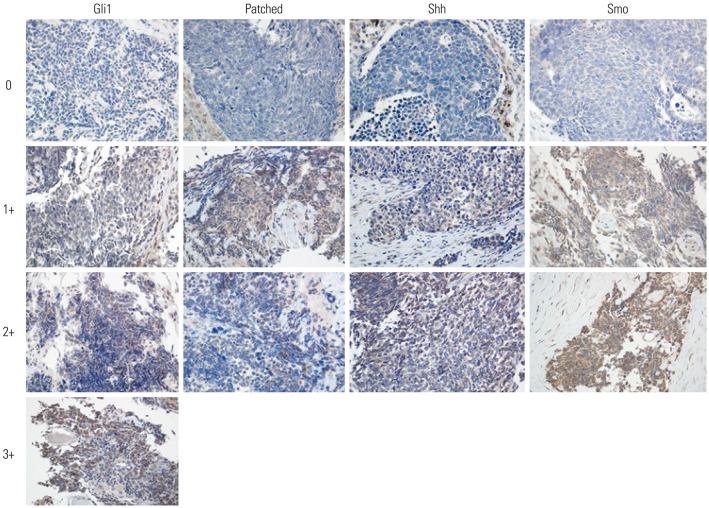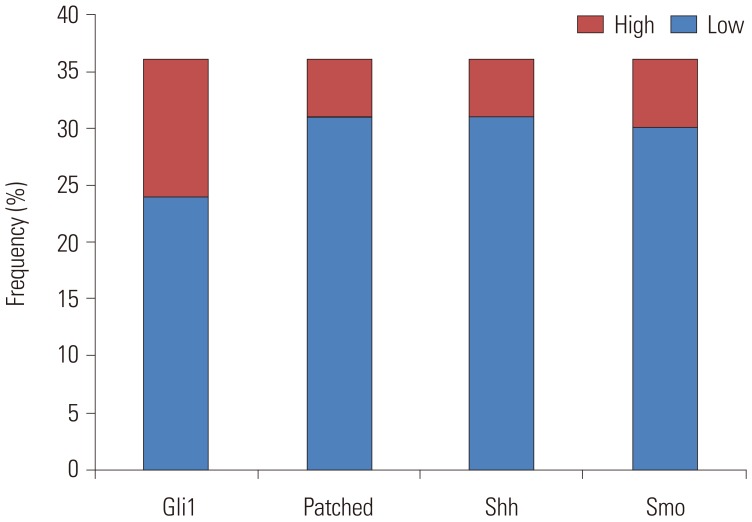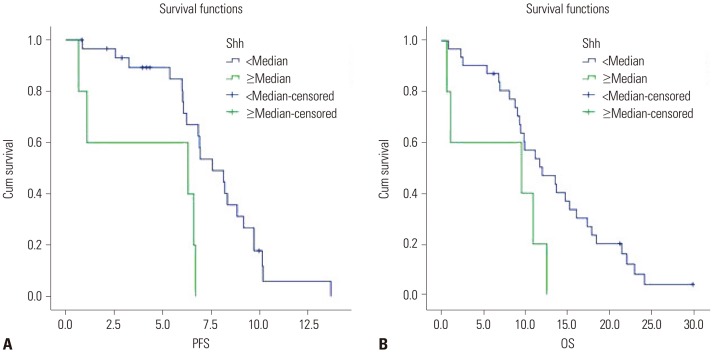Yonsei Med J.
2019 Oct;60(10):898-904. 10.3349/ymj.2019.60.10.898.
Sonic Hedgehog Pathway as the Prognostic Marker in Patients with Extensive Stage Small Cell Lung Cancer
- Affiliations
-
- 1Department of Hemato-Oncology, Wonju Severance Christian Hospital, Yonsei University Wonju College of Medicine, Wonju, Korea.
- 2Konyang University Myunggok Medical Research Institute, Daejeon, Korea.
- 3Division of Medical Oncology, Department of Internal Medicine, CHA Bundang Medical Center, CHA University, Seongnam, Korea. kim123@chamc.co.kr
- 4Seegen Medical Foundation, Seoul, Korea.
- 5Department of Pathology, Daejeon Son Hospital, Daejeon, Korea.
- KMID: 2459142
- DOI: http://doi.org/10.3349/ymj.2019.60.10.898
Abstract
- PURPOSE
Sonic hedgehog (Shh) signaling pathway is known to play a crucial role in carcinogenesis in various malignancies, including lung cancer regarding tumorigenesis, angiogenesis, and cellular differentiation. The aim of this study was to investigate the value of components of Shh pathway as a prognostic marker in extensive stage small cell lung cancer (ES-SCLC) patients.
MATERIALS AND METHODS
We retrospectively analyzed data of 36 patients who were diagnosed with ES-SCLC between 2008 and 2012 at a single center. We performed immuo-histochemistry for glioma-associated oncogene homolog zinc finger protein 1 (Gli1), patched, Shh, and Ptch-mediated repression of smoothened (Smo) proteins using formalin-fixed, paraffin-embedded tissue derived from primary tumors. We then conducted survival analysis to evaluate the prognostic impact of these markers.
RESULTS
All 36 patients received platinum-based doublet chemotherapy. The median progression free survival and median overall survival were 6.9 months [95% confidence interval (CI), 6.5-7.3] and 11.7 months (95% CI, 9.1-14.3), respectively. The overall response rate was 84%. Of the 36 tissue specimens examined, over-expression of Gli1, Patched, Shh, and Smo was found in 12 (33.3%), five (13.9%), five (13.9%), and six (16.7%) cases, respectively. We found that high expression of Shh was associated with worse progression free survival (6.3 vs. 7.6 months, p=0.005) and overall survival (9.2 vs. 12.0 months, p=0.039) by both univariate and multivariate analyses, whereas other markers were not related to patient prognosis.
CONCLUSION
A high proportion of small cell lung cancer tumors express proteins related to Shh pathway, and over-expression of Shh is correlated with poor prognosis.
MeSH Terms
Figure
Reference
-
1. Govindan R, Page N, Morgensztern D, Read W, Tierney R, Vlahiotis A, et al. Changing epidemiology of small-cell lung cancer in the United States over the last 30 years: analysis of the surveillance, epidemiologic, and end results database. J Clin Oncol. 2006; 24:4539–4544. PMID: 17008692.
Article2. Stupp R, Monnerat C, Turrisi AT 3rd, Perry MC, Leyvraz S. Small cell lung cancer: state of the art and future perspectives. Lung Cancer. 2004; 45:105–117. PMID: 15196740.
Article3. Schiller JH, Adak S, Cella D, DeVore RF 3rd, Johnson DH. Topotecan versus observation after cisplatin plus etoposide in extensive-stage small-cell lung cancer: E7593--a phase III trial of the Eastern Cooperative Oncology Group. J Clin Oncol. 2001; 19:2114–2122. PMID: 11304763.
Article4. Gailani MR, Ståhle-Bäckdahl M, Leffell DJ, Glynn M, Zaphiropoulos PG, Pressman C, et al. The role of the human homologue of Drosophila patched in sporadic basal cell carcinomas. Nat Genet. 1996; 14:78–81. PMID: 8782823.
Article5. Hahn H, Wicking C, Zaphiropoulous PG, Gailani MR, Shanley S, Chidambaram A, et al. Mutations of the human homolog of Drosophila patched in the nevoid basal cell carcinoma syndrome. Cell. 1996; 85:841–851. PMID: 8681379.
Article6. Johnson RL, Rothman AL, Xie J, Goodrich LV, Bare JW, Bonifas JM, et al. Human homolog of patched, a candidate gene for the basal cell nevus syndrome. Science. 1996; 272:1668–1671. PMID: 8658145.7. Tang JY, Mackay-Wiggan JM, Aszterbaum M, Yauch RL, Lindgren J, Chang K, et al. Inhibiting the hedgehog pathway in patients with the basal-cell nevus syndrome. N Engl J Med. 2012; 366:2180–2188. PMID: 22670904.
Article8. Berman DM, Karhadkar SS, Hallahan AR, Pritchard JI, Eberhart CG, Watkins DN, et al. Medulloblastoma growth inhibition by hedgehog pathway blockade. Science. 2002; 297:1559–1561. PMID: 12202832.
Article9. Sanchez P, Hernández AM, Stecca B, Kahler AJ, DeGueme AM, Barrett A, et al. Inhibition of prostate cancer proliferation by interference with SONIC HEDGEHOG-GLI1 signaling. Proc Natl Acad Sci U S A. 2004; 101:12561–12566. PMID: 15314219.
Article10. Sheng T, Li C, Zhang X, Chi S, He N, Chen K, et al. Activation of the hedgehog pathway in advanced prostate cancer. Mol Cancer. 2004; 3:29. PMID: 15482598.11. Thayer SP, di Magliano MP, Heiser PW, Nielsen CM, Roberts DJ, Lauwers GY, et al. Hedgehog is an early and late mediator of pancreatic cancer tumorigenesis. Nature. 2003; 425:851–856. PMID: 14520413.
Article12. Berman DM, Karhadkar SS, Maitra A, Montes De Oca R, Gerstenblith MR, Briggs K, et al. Widespread requirement for Hedgehog ligand stimulation in growth of digestive tract tumours. Nature. 2003; 425:846–851. PMID: 14520411.
Article13. Watkins DN, Berman DM, Baylin SB. Hedgehog signaling: progenitor phenotype in small-cell lung cancer. Cell Cycle. 2003; 2:196–198. PMID: 12734424.
Article14. Giroux Leprieur E, Vieira T, Antoine M, Rozensztajn N, Rabbe N, Ruppert AM, et al. Sonic hedgehog pathway activation is associated with resistance to platinum-based chemotherapy in advanced non-small-cell lung carcinoma. Clin Lung Cancer. 2016; 17:301–308. PMID: 26762562.
Article15. Wang YF, Chang CJ, Lin CP, Chang SY, Chu PY, Tai SK, et al. Expression of hedgehog signaling molecules as a prognostic indicator of oral squamous cell carcinoma. Head Neck. 2012; 34:1556–1561. PMID: 22287313.
Article16. Li Q, Zhang Y, Zhan H, Yuan Z, Lu P, Zhan L, et al. The Hedgehog signalling pathway and its prognostic impact in human gliomas. ANZ J Surg. 2011; 81:440–445. PMID: 22295347.
Article17. He HC, Chen JH, Chen XB, Qin GQ, Cai C, Liang YX, et al. Expression of hedgehog pathway components is associated with bladder cancer progression and clinical outcome. Pathol Oncol Res. 2012; 18:349–355. PMID: 21861243.
Article18. Hwang J, Kang MH, Yoo YA, Quan YH, Kim HK, Oh SC, et al. The effects of sonic hedgehog signaling pathway components on non-small-cell lung cancer progression and clinical outcome. World J Surg Oncol. 2014; 12:268. PMID: 25141859.
Article19. Lim S, Cho BC, Jung JY, Kim GM, Kim SH, Kim HR, et al. Phase II study of camtobell inj. (belotecan) in combination with cisplatin in patients with previously untreated, extensive stage small cell lung cancer. Lung Cancer. 2013; 80:313–318. PMID: 23510628.
Article20. Giroux Leprieur E, Antoine M, Vieira T, Rozensztajn N, Ruppert AM, Rabbe N, et al. [Role of the Sonic Hedgehog pathway in thoracic cancers]. Rev Mal Respir. 2015; 32:800–808. PMID: 25794996.21. Belani CP, Dahlberg SE, Rudin CM, Fleisher M, Chen HX, Takebe N, et al. Vismodegib or cixutumumab in combination with standard chemotherapy for patients with extensive-stage small cell lung cancer: a trial of the ECOG-ACRIN Cancer Research Group (E1508). Cancer. 2016; 122:2371–2378. PMID: 27163943.
Article22. Mok TS, Wu YL, Thongprasert S, Yang CH, Chu DT, Saijo N, et al. Gefitinib or carboplatin-paclitaxel in pulmonary adenocarcinoma. N Engl J Med. 2009; 361:947–957. PMID: 19692680.
Article23. Thatcher N, Chang A, Parikh P, Rodrigues Pereira J, Ciuleanu T, von Pawel J, et al. Gefitinib plus best supportive care in previously treated patients with refractory advanced non-small-cell lung cancer: results from a randomised, placebo-controlled, multicentre study (Iressa Survival Evaluation in Lung Cancer). Lancet. 2005; 366:1527–1537. PMID: 16257339.
Article
- Full Text Links
- Actions
-
Cited
- CITED
-
- Close
- Share
- Similar articles
-
- Serum CEA in Non-Small Cell Lung Cancer Patients
- Treatment for Extensive stage Small cell Lung Cancer
- A Clinical Therapeutic Results on Small Cell Lung Cancer
- Etoposide and cisplatin combination chemotherapy in extensive stage small cell lung cancer
- Hedgehog Related Protein Expression in Breast Cancer: Gli-2 Is Associated with Poor Overall Survival




